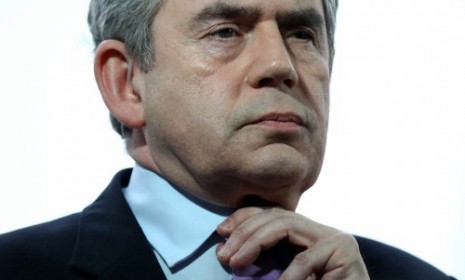The UK election: A quick guide
Three mainstream British parties are set to battle it out in Thursday's general election. Here's the lowdown

A free daily email with the biggest news stories of the day – and the best features from TheWeek.com
You are now subscribed
Your newsletter sign-up was successful
Voters in Great Britain will turn out to elect a new government on Thursday, with polls predicting defeat for Prime Minister Gordon Brown and a narrow victory for Conservative leader David Cameron. The results are far from a sure thing, however, given the rapid rise in popularity over the past month of third-party leader Nick Clegg. (Watch a report about the British election's close race.) Here's what Americans need to know about the three main players in Britain's election:
Gordon Brown - Labor
The party: The "traditional representative of the working class," Labor has been in power since 1997. Under Tony Blair, it lent military support to the U.S. in Iraq and Afghanistan, though the "special relationship" cultivated by Blair has wilted under Brown's leadership.
The Week
Escape your echo chamber. Get the facts behind the news, plus analysis from multiple perspectives.

Sign up for The Week's Free Newsletters
From our morning news briefing to a weekly Good News Newsletter, get the best of The Week delivered directly to your inbox.
From our morning news briefing to a weekly Good News Newsletter, get the best of The Week delivered directly to your inbox.
The candidate: Gordon Brown, who succeeded Tony Blair as prime minister in 2006. A dour Scotsman obsessed with policy over presentation, Brown has been compared to Al Gore. Lagging in the polls, Brown is likely to lose power on Thursday.
Endorsed by: Comedian Eddie Izzard and Harry Potter author JK Rowling
David Cameron - Conservative
The party: The party of Margaret Thatcher and Winston Churchill, the "Tories" are to the right of the other mainstream parties. A victory for the Conservative Party would mean a "distinctive British foreign policy," which could lead to "greater independence from U.S. foreign policymaking," says one British think tank.
A free daily email with the biggest news stories of the day – and the best features from TheWeek.com
The candidate: A privately educated career politician, Cameron goes into the election with a slight lead in the polls. He would hardly be considered a staunch conservative in the U.S.—his "social liberalism and his emphasis on the environment would make him a moderate Democrat," says Daniel Allott in the American Spectator.
Endorsed by: Actor Michael Caine and American Idol host Simon Cowell
Nick Clegg - Liberal Democrat
The party: Britain's third party—and its furthest Left—the Liberal Democrats are seeking to terminate the U.K.'s open-ended commitment to Afghanistan. Accomplishing that could be within reach, if the Liberal Democrats become a powerful partner in a governing coalition with either Labor or the Tories.
The candidate: Clegg, who has been compared to Obama after his success in the leadership debates, is very unlikely to end up as prime minister due to the various intricacies of Britain's political system. Conservatives in the U.K. say he has a "striking disdain for the trans-Atlantic alliance" with America, and would move the country further to the left if he ends up holding substantial power in a coalition government.
Endorsed by: Monty Python star John Cleese and actor Colin Firth.